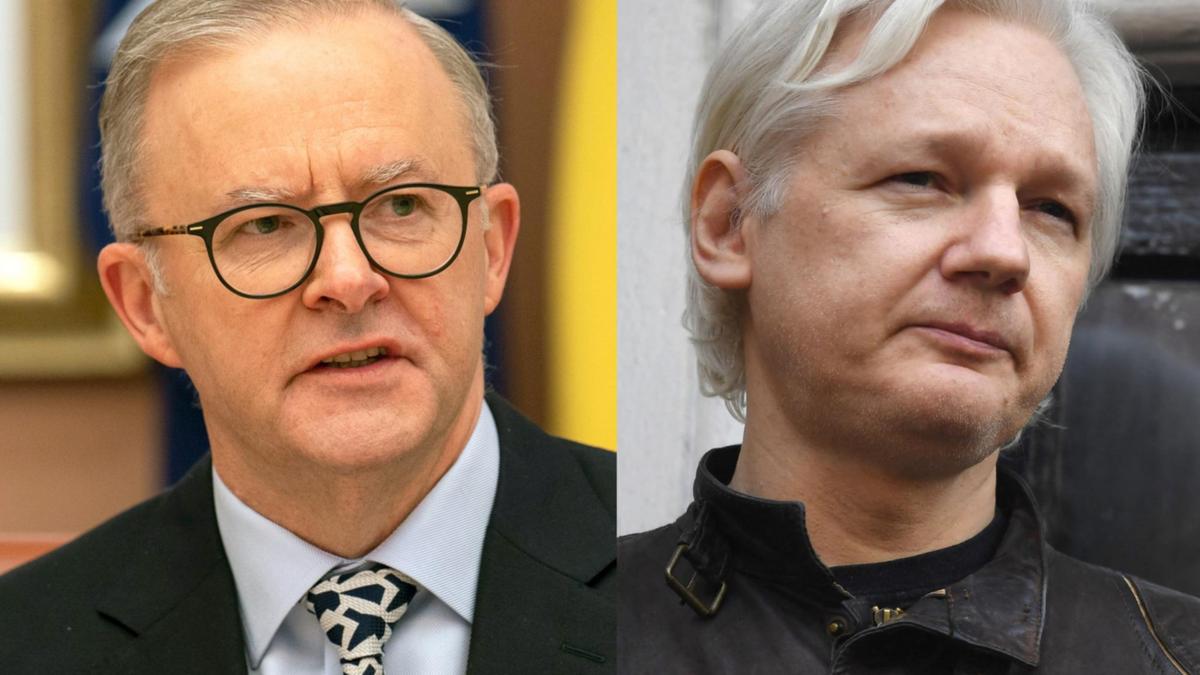Australian Prime Minister Anthony Albanese expressed dissatisfaction with the US’s ongoing efforts to persecute Wikileaks founder and Australian citizen Julian Assange, saying, Enough is enough there is nothing to be served by his continued incarceration.”
Comments by Albanese In an interview with the Australian Broadcasting Corporation on Friday, Assange attempted to increase diplomatic pressure on the US to drop the allegations against him. Assange, 51, has spent four years in Britain’s Belmarsh Prison fighting extradition to the US. Previously, Assange had sought shelter in the Ecuadorian Embassy in London for seven years.
According to Albanese, the case of Assange must be reviewed in terms of whether the time Assange had “effectively served” was more than what would be “reasonable” if the allegations against him were proven.
“I simply state that enough is enough.” “His continued incarceration serves no purpose,” Albanese added.
“I understand how frustrating it is; I understand.” “I can’t do much more than state my position, and the US administration is certainly aware of the Australian government’s position,” Albanese added.
Assange exposed US military
For years, Assange has fought in British courts to prevent extradition to the United States, where he faces 17 counts of espionage and one count of computer abuse stemming from Wikileaks’ publishing of a massive trove of sensitive data in 2010.
American prosecutors claim he assisted US Army intelligence analyst Chelsea Manning in stealing confidential diplomatic cables and military papers that were ultimately disclosed by Wikileaks, putting lives in danger.
To his fans, Assange is a journalist who exposed US military misbehaviour in Iraq and Afghanistan.
According to Albanese, there is a “disconnect” between the US treatment of Assange and Manning. Manning’s 35-year sentence was commuted to seven years after coming out as trans by then-President Barack Obama, allowing her release in 2017.
Albanese has stated that he had campaigned for Assange in meetings with officials from the Biden administration. On Friday, he declined to say whether he would bring up Assange with Biden when Albanese welcomes the US president, India’s prime minister, and Japan’s prime minister in Sydney on May 24.
“The way diplomacy works… is probably not to forecast the discussions you will have, or have had, with leaders of other nations,” Albanese explained. “I’ll engage diplomatically to achieve a result.”
Albanese stated that he did not want to engage into a debate over whether Assange’s alleged acts were correct or incorrect.
Albanese cited a British district court ruling, which has since been reversed, that denied the extradition request on the basis that Assange was likely to commit suicide if imprisoned in the United States.
“I am concerned about Mr. Assange’s mental health,” added Albanese. “There was a court decision in the United Kingdom that was overturned on appeal that went to Mr. Assange’s health as well, and I am concerned for him.”
US Persecution of Julian Assange Founder of Wikileaks
The US government has sought Julian Assange’s extradition to face charges connected to his participation in the publication of sensitive documents. In the United States, Assange is currently facing 18 counts, including espionage and conspiracy to commit computer penetration. He faces up to 175 years in jail if convicted.
A UK judge refused the US government’s request for Assange’s extradition in January 2021, citing the risk of suicide if he was sent to the US prison system.
The US government, however, is appealing the verdict, and legal proceedings are underway.
Assange’s prosecution has been controversial, with some claiming that it is an attack on press freedom and the right to free expression. Others contend that Assange’s actions went beyond journalism and posed a national security risk.
The case has highlighted significant concerns about the balance between national security and journalistic freedom, as well as arguments over the use of espionage laws to punish journalists.
Wikileaks is a non-profit organisation that publishes sensitive or classified material from governments, businesses, and other organisations. Julian Assange, an Australian computer programmer and activist, and a group of like-minded individuals launched it in 2006. The stated purpose of Wikileaks is to promote openness and accountability in government and other organisations by disclosing information that the public has a right to know.
Wikileaks has released a vast number of classified papers over the years, including diplomatic cables, military records, and other sensitive information. The Iraq War Logs and the Afghan War Diary, two of the organization’s most significant publications, disclosed previously unknown details concerning the conduct of the conflicts in Iraq and Afghanistan. Wikileaks has also released information on a variety of other subjects, such as government spying, business malfeasance, and political campaigns.
Wikileaks has received both praise and criticism over its actions. Supporters contend that the organisation is critical in exposing government and corporate misconduct, while detractors claim that it endangers lives and jeopardizes national security.
The Wikileaks controversy has resulted in a variety of legal challenges, including the US government’s efforts to extradite Julian Assange to face charges linked to his role in leaking secret information.








